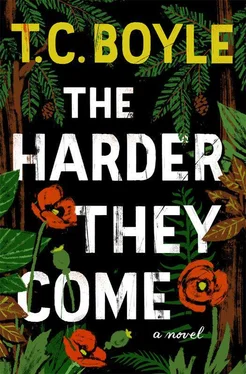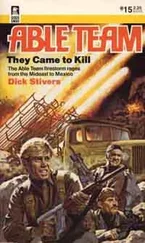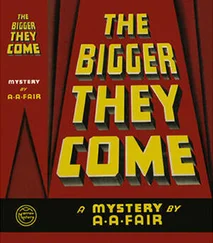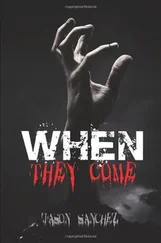Sten was noncommittal, but he was aroused: more dark little men, more criminals. And here, right here in the U.S. He was no racist — he’d seen the demographic shift in the school population over the years, the Swedes, Norwegians, Italians and Poles who’d worked the lumber mills when they were a going concern giving way ever so gradually to the Hispanics who cleaned their houses, repaired their cars, stocked the shelves in the supermarket and made up the beds for the tourists, and it had meant nothing to him, immigrants in a nation built on them — but when they destroyed the land, drove people out of their own parks and forests, it was another thing altogether. He’d seen their abandoned camps deep in the woods, the mounds of trash, the carcasses of the animals, oil and pesticides leaching into the ground, the abandoned propane tanks and crude listing shacks. It was a matter of ecology as much as anything else. Save the forests. Save the trout. The salmon. The deer.
“We’re going to have to use your car. Because I told you, I jogged here”—Carey picked at the front of his T-shirt in testament—“and mine’s all the way back at home.”
“Follow them? Isn’t that a little extreme?”
“We stay back, way back. Just till we see what road they turn off on.”
“Then we call the sheriff?”
“Yeah, then we call the sheriff.”
THEY WERE DRIVING A new Ford XLT pickup, white, with Nevada plates and dust-streaked sides, which only seemed to confirm Carey in his suspicions, as if every Mexican had to be driving a beater prickling with rakes, shovels and blowers, as if it were a condition of their lives on this planet, as if the stereotype was the only type. “Stolen,” he said. “Bet anything.”
Sten just nodded. But it was odd, he had to admit it. He wanted to think they were traveling mariachis, the construction crew for some millionaire building a getaway in the hills, a church group, real and bona fide, but as he sat behind the wheel of the Prius in the parking lot, Carey at his side, and watched them load the groceries into the bed of the truck, he knew he was fooling himself. He’d tried to appear casual at the checkout stand as the girl there, a Latina with heavy purple eye shadow who might or might not have been a student at the high school, scanned his items. Hovering over the counter in his jeans and sweatshirt, he went quietly about the business of bagging his forty-two dollars and thirty-five cents’ worth of groceries, nothing amiss, the most ordinary thing in the world, but out of the corner of his eye he was watching the Mexicans in the next checkout lane while Carey kept a lookout at the door. They had a third cart he hadn’t noticed before, this one filled with plastic jugs of water, half a dozen twenty-four-packs of Tecate and a couple bottles of E&J brandy, real rotgut, not at all the sort of thing you’d take on a church picnic.
The men huddled there in their askew caps and they didn’t say a word, not to their own checkout girl or to each other either. They looked at nothing, at the wall, at the floor. When the customer ahead of them — the woman with the celery — had concluded her transaction, they came to life, juggling things from the carts to set them neatly on the rolling black conveyor belt. Sten took his time so he could study them, the three young guys doing all the work while the older one stood there watching the display on the computer screen as if totting up every item in his head. The bill, which the older man paid — in cash — came to over seven hundred dollars.
There was a row of cars separating Sten’s Prius from their pickup, and if they noticed him and Carey sitting there, they gave no indication. They were focused on what they were doing, and they were quick and efficient, the groceries transferred from the carts in minutes, and then the older man got behind the wheel while two of the younger ones slipped in beside him and the third sprang up into the bed in a single bound, nimble as a gymnast. Sten waited until the Mexicans had backed out of their spot, conscious of Carey, who’d gone quiet with the tension of the moment, and then put the car in drive and slowly followed them out of the lot. The street they were on — Franklin — paralleled the Coast Highway, which was the town’s main thoroughfare and lively with traffic this time of year, what with all the tourists either coming or going, even in the morning, especially in the morning, because tourists liked to get right up, gulp down their coffee, eggs over easy, three strips of bacon and hash browns and hit the road to invade the next charmingly decrepit coastal town before everybody else got there. He was surprised when the pickup turned left — no signal, just a lurch — and headed down the block to turn right on the Coast Highway, where they’d be more visible to any patrol car that might happen by. But then — and he had to remind himself lest he get carried away — they really hadn’t done anything, had they? Aside from pumping seven-hundred-odd dollars into the local economy, and what was wrong with that?
“Watch it,” Carey said, “watch it!” and he saw that he’d come up too close on them, almost rear-ended them in fact, swerving now, at the last moment, as the pickup — no signal — swung into a gas station and he rolled on by, the blood pounding in his temples and his hands locked on the wheel, trying his best to look innocuous. And old. Old and befuddled. No problem there.
Carey’s voice came at him again, insistent: “Pull over. Here. Behind that van.”
He flicked on the signal, did as he was told. The gas station was a block behind them. Glancing in the rearview, he saw the white truck ease up to the pump there and one of the men — the one in back — jump out to flip open the gas tank and insert the nozzle before hurrying inside to pay, in cash, because what drug dealer, what grower, would use a credit card?
“Jesus, Sten, what are you thinking? You almost hit them.”
And now he began to feel the faintest tick of irritation. He hadn’t had his breakfast, his groceries weren’t getting any fresher, he was tired and fed up and here he was chasing phantoms while Carey Bachman barked orders at him. “But I didn’t,” he said, and gave him a steady look. “Did I?”
They waited there at the side of the road till the pickup was in motion again, its blunt hood and massive grill nosing up to the street as a clutch of motor homes lumbered by, and then, without warning, the pickup was cutting across both lanes and heading back in the direction they’d come from and Carey, his voice rising, jerked up so violently in his seat the whole car rocked on its springs. “Cut a U-ey, quick, quick!” he shouted. “They’re turning left. Hit it, come on!”
The Prius was built for gas mileage, not the Indianapolis 500, but it had enough acceleration to get you through a tight spot if your reflexes served you and Sten’s did. He was able to pull out front of the first creeping motor home and slash a U-turn with a minimal squeal of the tires and a single admonitory blast of the startled driver’s horn, and he kept his foot on the accelerator until he was fifty feet from the tail of the pickup, which continued half a block south before making an abrupt left back up the street they’d just followed it down. All right. He slowed, hung back, watched the pickup continue straight on up the road, the sun just beginning to poke through in the distance to illuminate the world in a soft wash of color, and did his best to keep up without being too obvious about it.
Carey had gone rigid but for the bounce of one agitated knee. “They’re heading straight up into the hills,” he cried, his voice thin with excitement. “Didn’t I tell you? Huh?”
Sten wanted to say, What does that prove? , but he was feeling it now too, more certain by the minute that Carey was right, that they were onto something. A load of groceries like that? There wasn’t much up here, once you got out of town — a couple of ranches, deep woods, the Georgia Pacific property he or Carey or one of the others hiked twice a week to make sure nothing like this was going on, to report it, which was what they were going to do now, just as soon as they saw where the illegal operation was. He didn’t say anything, just focused on the white gleam of the pickup ahead of him, which wasn’t doing much more than forty-five or so. He eased up on the accelerator. Held tight to the wheel. A car appeared around the next corner, coming the opposite way, followed by a battered pickup, its bed stacked high with baled hay — horses out here, a smattering of cattle, chickens, turkeys (and weed too, that went without saying, but that was different because what people did on their own private property for their own consumption — citizens, American citizens — was nobody’s business but theirs). The Prius shook ever so slightly with the motion of their passing, and then the road was clear but for the white pickup with the shadowy figures inside and the man in back propped up against the cab and looking straight at them, his gold-and-green hat flashing in the light like a homing beacon.
Читать дальше












